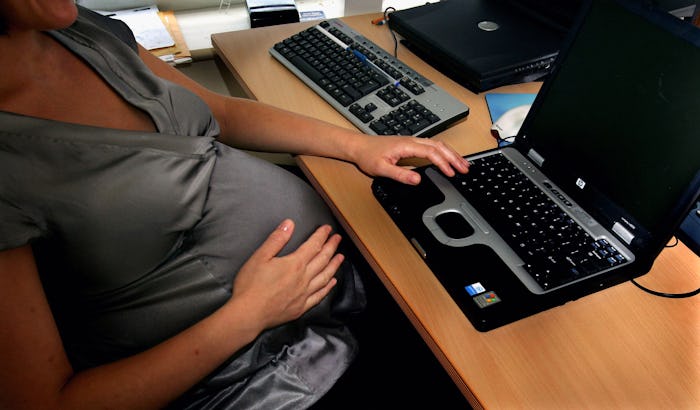Life

Moms Are Judged Regardless Of Whether They Take Paid Leave
Damned if you do, damned if you don't: Moms taking maternity leave are caught in an infuriating catch-22 within the workforce, according to a new study out of the University of Exeter. The study suggests that moms are held to unrealistic standards on maternity leave, and only furthers the narrative that women are expected to have it all while simultaneously being chastised when they can't. So basically, this study confirms the double standard of bias against working moms known as the "maternal wall" — either she's committed to her job, or she's committed to her kids — but there's no way it's possible she could actually be committed to both. It's also known as the motherhood penalty.
Psychologist and study coauthor Thekla Morgenroth told Fatherly, "If [women] take maternity leave, they will be judged badly in the work domain, but if they decide not to take it, they are seen as a bad parents and less desirable partners." As if working moms didn't already have to grapple with feelings of guilt and inadequacy, Morgenroth's study only confirms for these working moms that there is a real basis for their fears. This is about more than working moms seeking to strike an ideal work-life balance: This study corroborates a gendered bias against parents in the workforce — even when moms are trying to "do the right thing" by taking paid leave.
Morgenroth's study had nearly 300 volunteer participants — all employed — play the role of an HR professional by reading from a script, speaking to a fictitious female employee named "Jennifer." There were three scripts from which study participants were randomized to read: One for a pregnant Jennifer planning on taking maternity leave, another for a pregnant Jennifer who she declined maternity leave, and a third that didn't mention if Jennifer was pregnant. After these scripted readings, study participates were asked to rate their impressions of Jennifer in the areas of job commitment, family commitment, job competence, parental competence, and partner desirability. The results were pretty bleak.
For working moms who have the luxury of paid leave — because paid maternity leave is not universal within the American workforce — the choice to take advantage of such a benefit clearly has its drawbacks, as Morgenroth's study suggests. What's even more frustrating is that deeply-ingrained cultural perceptions about the roles of men and women in the workplace — that men should be workers while women should be caregivers — only hold everyone back. Even additional perceptions about what makes a "good worker" and a "good mom" only further fuel unrealistic expectations on moms already feeling the crunch of juggling job and kids.
Morgenroth's study indicates that mandating paid family leave for all parents could be the first and most important step in changing these cultural expectations of men and women. If all parents get paid leave, then it's a lot harder to label women as either "bad workers" or "bad moms" when they have children. According to an April U.S. Department of Labor report, when nearly 90 percent of American families have at least one working parent, it's time employers start seriously changing their thinking around working parents.
Until then, what's a working mom to do? All that she can ever really do on any given day — the best she can.